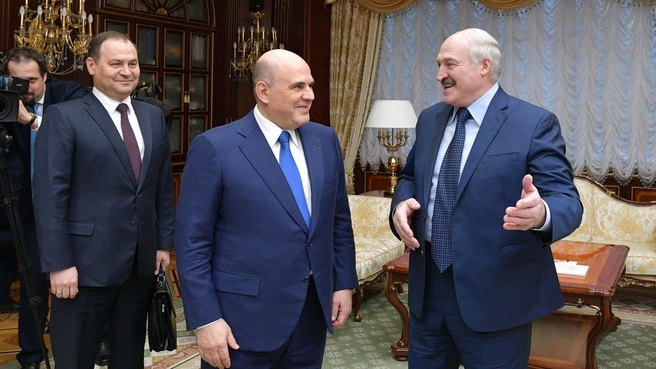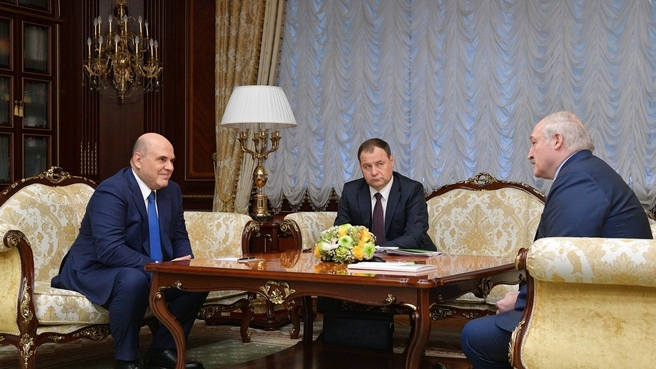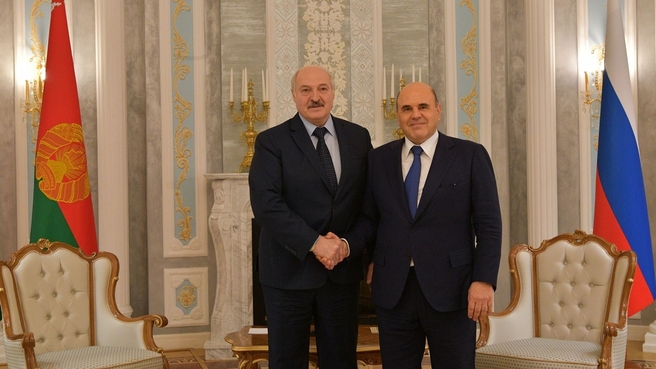Excerpts from the transcript:
Conversation with President of Belarus Alexander Lukashenko and Prime Minister of Belarus Roman Golovchenko
Alexander Lukashenko: Mr Mishustin, I am glad to welcome you to Belarus. Our meeting and your talks with the Government of Belarus have resulted from the suggestion made by President Vladimir Putin during our meeting in Sochi, where we discussed a number of topics and pinpointed the subject we will focus on today. He told me to listen to your views on the system you had created through hard work. He told me we would need it in Belarus.
I am grateful that you have acted on the President’s instructions and have come to Belarus together with a team of experts to discuss one of our biggest problems. The key word here is that it is just one of our problems. We have always been pressed for time. Russia and Belarus never had an easy life. Nevertheless, time is prodding us on towards settling the current problems. They have not piled up yet, but they are there, and we must deal with them.
We are ready to discuss these problems with you openly and sincerely, because we are aware of your earnest attitude to Belarus.
This is why I am glad that we have met today. This is the first event of this kind. Yesterday, Mr Putin and I coordinated your agenda regarding many issues. In late April, most probably, on 22 April, I will have a meeting with the President in Moscow. It will be a very serious meeting held to discuss the issues we will be talking about today. After that, there will be a Forum of Russian and Belarusian Regions, to be held in the Moscow Region, then a meeting of the Union State Council of Ministers, and after that, in September or October – we will coordinate the timeframe later – we will hold a meeting of the Supreme State Council of the Union State. We must be able to report to it on good progress made within the framework of the Union State.
These are the agreements we have coordinated with the President of Russia in the past two days, among other things.
Mikhail Mishustin: Mr Lukashenko, thank you. I am delighted to be in Minsk. I would like to thank you, on behalf of our delegation, for the hospitable welcome, which we always receive here. I would also like to take this opportunity to convey warmest regards from Mr Putin. I discussed the details of our cooperation with him just before coming here. I would like to add that we maintain regular, I would even say daily contact with Roman Golovchenko and other members of the Belarusian Government. All our ministers, their deputies and representatives of various agencies are working steadily to improve our relations and to deal with current problems.
We are gradually restoring our trade. It is growing. Regrettably, it had plunged seriously due to the coronavirus. It is reviving now. We have reopened flights. On 30 April, a Lastochka train will arrive from Moscow to Minsk. We welcome these developments, and we are happy that the coronavirus infection is, thankfully, receding.
Of course, there are many issues we need to address yet. Our medics have warned us about the risks of new coronavirus strains. But I hope that we will protect ourselves from the virus by taking joint measures. The commercial production of Sputnik V vaccine began in Belarus on 25 March. We are working with your scientists, and we know that they will produce their own vaccine soon.
We are actively cooperating in industry, energy, transport infrastructure and construction. The Year of Russia in Belarus is underway in 2021, and next year will be the Year of Belarus in Russia. We will intensify our cultural ties and the exchanges of cultural delegations. Mr Golovchenko and I have signed a programme that stipulates even broader ties next year. I would like to thank you for this approach.
As you have said, today we will discuss possible ways to integrate our systems. I have old acquaintances in the Belarusian customs and tax services; they are top-notch professionals. Our systems should be integrated because they interact on a continuous basis.
What is the essence of integration? It is anything that can benefit our Union State, but it is not in any way some kind of takeover. This is how we see it. We have tried to explore the possibilities that our integration can offer on the basis of the best Belarusian and Russian technologies.
We will discuss this today. Mr Golovchenko and I have prepared for this. And we will be glad to show you what we can offer each other.












